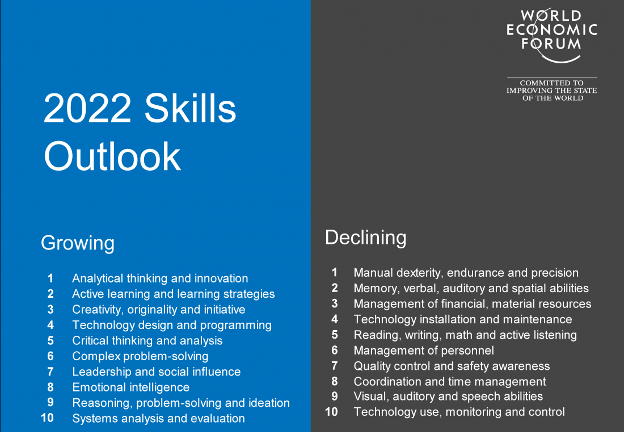In the 2015 World Economic Forum Future Jobs report it was stated that Emotional Intelligence would be one of the top 10 skills needed in 2020. This was confirmed now in 2020 in the actual data from LinkedIn, where Emotional intelligence was top 5 of most in demand soft skills. Emotional intelligence, together with problem solving, critical thinking and creativity form part of the essential top skills needed at these black swan times.
The World Economic Forum Future Jobs 2022 report, the skills required to perform most jobs will have shifted significantly. Emotional Intelligence has remained critical on the top skills list. Global average proportion of core skills required to perform a job that will remain the same — is expected to be about 58%. That means workers will see an average shift of 42% in required workplace skills in the period leading up to 2022. Leading to the need for global reskilling.

Skills growing in prominence include analytical thinking and active learning as well as skills such as technology design, highlighting the growing demand for various forms of technology competency. However, proficiency in new technologies is only one part of the 2022 skills equation. “Human” skills such as creativity, originality and initiative, resilience, flexibility, complex problem-solving, critical thinking, and persuasion will likewise retain or increase their value. Emotional intelligence, leadership and social influence are also set to see particular increase in demand relative to their current prominence today. The seven professional areas which will see growth: care, engineering and cloud computing, sales marketing and content, data and AI, green jobs, people and culture, and specialized project managers.
Emotional intelligence is the game changer in the Artificial intelligence, innovation and disruptive and ever-changing times. The secret is that found in the deeper definition and understanding of Emotional intelligence many of the other critical skills are informed and enabled by Emotional Intelligence. The neuroscience shows that our emotions has direct effect on our decisions and behaviour due to the emotional brain the Amygdala.
Positive emotions tend to broaden and build the way we think and behave, helping us see more options and respond more, Creatively. Conversely, negative emotions tend to narrow and limit our thinking reduce our perspective and causing more Reactionary behaviour. The challenge in today’s world is that many threats are psychological such as stress, work hours, home-schooling, pandemics and isolation. These are not life threatening yet similarly inhibit our thinking and results in reactive behaviour.
We will all need to become lifelong learners. On average, employees will need 101 days of retraining and upskilling in the period up to 2022. Emerging skills gaps — both among individual workers and among companies’ senior leadership — may significantly obstruct organization’s transformation management. As jobs are transformed by the technologies of the Fourth Industrial Revolution, it is of critical importance that we continuously keep on growing and re-skilling ourselves.
Knowledge is not power. Applied Knowledge is power. Emotional Intelligence applies the knowledge you possess, it is the switch, converging ideas from both sides of the brain helping you … manifest your excellence.
Contrinued by: Chantal Kading, Managing Director, Executive Search Principal Consultant, Career & Life Coach, The People Shop